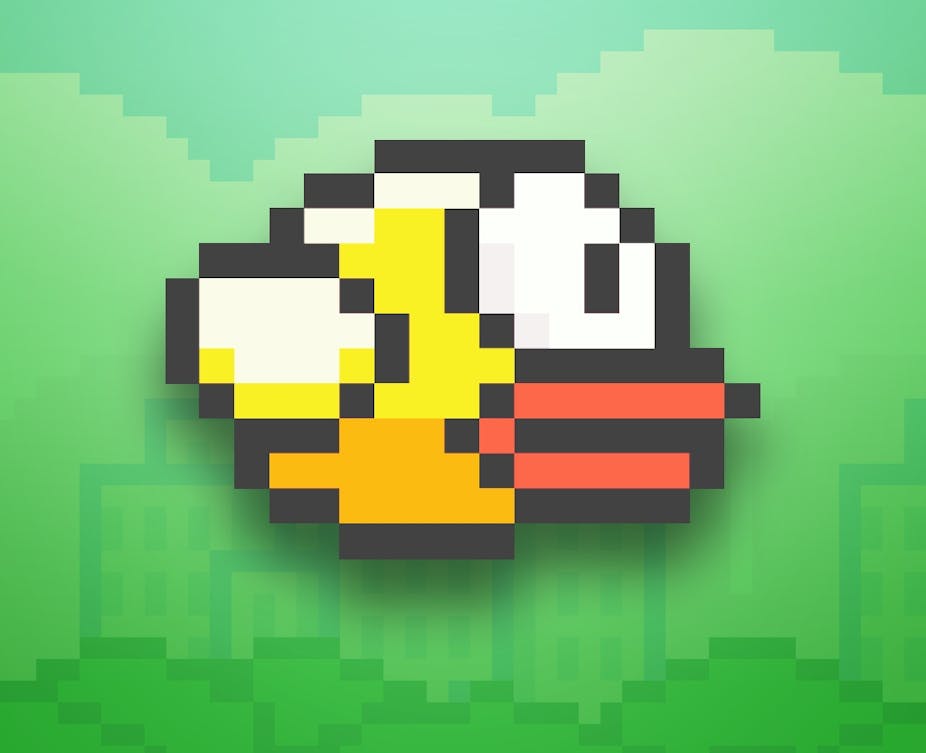Flappy Bird, a deceptively simple gaming app, has been withdrawn by its creator Dong Nguyen because it is too “addictive”.
His decision appears to have sparked a frenzy among fans who are reportedly so desperate to get their hands on the famed bird that they are willing to hand over big money to play. Whether or not this is true, hawkers are indeed listing phones and tablets on eBay with the app installed for hundreds of pounds and in some cases thousands.
The game’s celebrity is such that tribute versions have been released and criminals have spotted an opportunity to cash in by producing copycat versions that install malware on players’ devices.
Nguyen appears to have stumbled into a major controversy with his creation, but whether or not he is right that the game is an addiction is a tricky question.
Flappy Bird is the latest in a long line of casual game apps, such as Angry Birds and Candy Crush Saga, that have all taken flack for getting some players hooked to the point of allowing the game to take over their lives.
All of us that work in the field of addiction have different definitions of what addiction actually is. When it comes to video games or gambling, we think about the problem in terms of behavioural addiction rather than a chemical addiction to a drug. Doing something excessively may be related to addiction but is not itself a criterion as all addictions rely on context. The basic difference between a healthy enthusiasm and an addiction is that healthy enthusiasms add to life whereas addictions take away from it. Playing games like Flappy Bird or Candy Crush Saga excessively may not be a productive use of time but that doesn’t necessarily make them an addiction.
Most casual games have very simple rules and each individual game lasts a relatively short time – sometimes just a few seconds, as in the case of Flappy Bird. The games are infuriatingly simple and as soon as the game is over it leaves players feeling frustrated, annoyed or even angry if they’ve scored badly, or happy, excited and even euphoric if they’ve done well. For those not doing very well, the only way to stop this cognitive regret is to play again immediately. For those that do well, they immediately want to play again to try and beat their high score.
Many casual games are gender-neutral and have a moreish quality – a bit like chocolate, which is really hard to eat in small amounts. These games fit in flexibly around what individuals do in their day-to-day life but, at the same time, they take up all the player’s cognitive ability because they have to concentrate on it completely to make any progress. By being totally absorbed, players can forget about everything else for a few minutes. This can be particularly appealing for players that want to use games as a way of temporarily forgetting about everything else that’s going on in their lives. One video game review I came across said:
Flappy Bird is the latest weirdly addicting game to captivate mobile users. The reason is simple, if not straightforward. In the guise of a cartoonish time-waster, Flappy Bird offers some of the most punishing, hardcore gameplay you can imagine. And it’s sucking in players by the millions.
Psychologically, casual games like Flappy Bird rely on both positive and negative reinforcement over speedy gameplay. Many “freemium” games, which are free to download but then push upgrades or ads on users, use psychological foot-in-the-door techniques that lead a small minority of people to pay for add-ons that they may never have originally planned to buy before playing the game. Once you’re engrossed in playing and want to continue, you are more open to handing over your money. It’s akin to leading customers into impulse buying in other commercial environments.
I’ve also argued that many casual games share similarities with gambling. On first look, games like Candy Crush Saga may not seem to have much connection to gambling, but the psychology is very similar. Even when games do not involve money, they introduce players to the principles and excitement of gambling. Small unpredictable rewards lead to highly engaged, repetitive behaviour.
In a minority, this may lead to addiction. People keep responding in the absence of reinforcement hoping that another reward is just around the corner. This is a psychological principle called the partial reinforcement extinction effect, which is rooted in operant conditioning. Behaviour that is reinforced sporadically, at unpredictable times, is more likely to continue than behaviour that is rewarded at regular, predictable intervals. It’s a technique that is used to great effect in both slot machines and most video games because players are never quite sure if their next move will be the one that triggers a reward.
Physiologically, games like Flappy Bird are likely to increase dopamine levels when people are doing well and noradrenaline when they fail. The interaction of two competing neurotransmitter systems is likely to keep players engaged in the game for periods longer than they originally intended.
Apps like Flappy Bird and Angry Birds are ingeniously simple but affect the mind and body in complex ways. They are highly enjoyable and, as some players describe them, “emotionally intoxicating”. I’ve only ever come across a few people that I would define as genuinely addicted to these games but all the ingredients are there to make it theoretically possible for almost anyone to be psychologically seduced by them.

